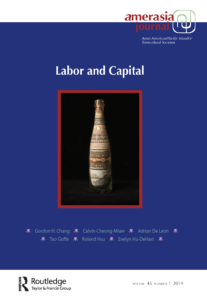*DEADLINE EXTENDED TO MARCH 31, 2024*
Call for Papers: On the Twenty-fifth Anniversary of Asian Settler Colonial Critique
Guest Editors: Katherine Achacoso (Dartmouth College), Josephine Ong (UCLA/Dartmouth College), Beenash Jafri (UC Davis), and Candace Fujikane (UH Mānoa)
Publication Date: Planned for Summer 2025
Submission Requirements: Scholarly essays: 5,000-6,000 words (not including endnotes), due MARCH 31, 2024
It has been over twenty years since the 2000 publication of Haunani Kay Trask’s essay, “Settlers of Color and Immigrant Hegemony” in Amerasia Journal. At the time, there were few critical engagements in the field of Asian American studies foregrounding Asian settlers’ responsibilities to Indigenous sovereignty, and little language to map the intersections between Asian diasporic experiences and Indigenous experiences of dispossession and sovereignty. As some scholars have sought to find alternative terms to “Asian settler,” others have worked to map the relationship between Asian diasporic experiences of migration and settlement and the experience of dispossession on Indigenous lands in Turtle Island and the Pacific. In our move from ethnic studies to critical ethnic studies, we are thinking more about relationalities and intersectionalities.
With the creation of the Asian Settler Colonialism Caucus as part of the Association of Asian American Studies in 2018, in addition to the frequency of references to “Asian-Indigenous relationalities,” an analytic of Asian settler colonialism extends to consider relationalities between different kinds of Asian settlers and Indigenous peoples in Asia. This approach has helped to reexamine different forms of intersectionalities, like that of caste in the operations of Asian settler colonialism. Liberatory scholarship and pedagogy at the intersections of Asian American and Indigenous studies open more capacious engagements of decolonization, ones rooted in Indigenous land-based struggles and futurities beyond the confines of settler states like Canada and the U.S.
In this special issue, we invite scholars, activists, and community organizers working on these intersections to contribute essays, creative work, and interviews reflecting the shifting conversations and debates in the field. For example, Asian American studies has evolved beyond the political borders and imaginaries of the United States to take up place-based genealogies in engaging different racial/settler geographies of Indigeneity, while discussions of Asian migration have broadened engagements on the intersections between Asian American and Indigenous studies. From critical settler colonial critiques in Tkaronto to Guåhan to Coast Salish Territories, new scholarship has expansively engaged interdisciplinary theories and methods from fields like Black studies, Indigenous feminisms, women of color feminisms and queer of color critique, eco-criticism, critical refugee studies, Dalit studies, critical militarization studies, disability studies, and critical ethnic studies to form what we now describe as a subfield of “Asian settler colonial critique.”
Among this emerging group of scholar-activists, there have been ongoing conversations on revisiting the intersection between Asian-Indigenous relationalities considering Asian-Indigenous peoples in what is called “Asia” and across the diaspora. Here, unsettling the binary that is often attributed to Asian American and Indigenous experiences in Turtle Island and the Pacific, Asian Indigenous scholars and activists in settler colonial sites like the Philippines, India, Thailand, Israel, and Okinawa have raised robust questions about the functioning of Asian nation-state as settler states that participate in the ongoing dispossession of Indigenous peoples in Asia. This scholarship has also contributed to broadening conversations of Asian settler colonialism through an attentiveness to transnational and trans-Indigenous contexts of resistance.
In this special issue, we invite scholars to contribute scholarly and creative works on topics such as, but not limited to, the following:
- Intersections between queer of color critique and queer Indigenous studies
- Land- and water-based scholarship thinking through the intersections of Asian and Indigenous relationalities
- Community organizing thinking through Asian settler perspectives
- Indigeneity and Settler Colonialism in Asia, and its relationship to diaspora
- Black/Asian/Indigenous relationalities in Caribbean and Afro-Caribbean diasporas
- Decolonial pedagogy engaging the intersections of Asian diasporic and Indigenous experiences
- Literature, art, film/media and other creative interventions on Asian diasporic and Indigenous histories, experiences, and relationalities
- Black/Asian/Indigenous relationalities in Oceania or Moana Nui
- Asian Diasporic scholarship engaging the intersections of carceralism / abolition / #landback
- Demilitarization and the Nuclear-Free Pacific
- International and trans-Indigenous social movements and activist networks
- Politics of religion and religious conversion
- The perils and pleasures of solidarity
- Indigenous feminist framings of land and Indigenous ties to it
- Climate crisis, global extractive histories, and ecology
- Decolonial futurities
Please submit your paper at: https://www.editorialmanager.com/ramj/default.aspx. There, you can find author instructions for uploading your submission, which requires a user account. The guest editors, in consultation with the Amerasia Journal editorial staff and peer reviewers, make decisions on the final essays:
- Initial review of submitted papers by guest editors and Amerasia Journal editorial staff
- Papers approved by editors will undergo blind peer review
- Revision of accepted peer-reviewed papers and final submission
Please contact Arnold Pan, UCLA AASC Press Editor, with any questions regarding your submission: arnoldpan@ucla.edu.

 This special issue of Amerasia Journal on labor and capital comes as two significant milestones in the history of Asian America are being commemorated: the 150th anniversary of the completion of the transcontinental railroad, with its dependence on Chinese labor, and the 50th anniversary of the establishment of Asian American studies in U.S. universities. Guest edited by Gordon Chang of Stanford University, the issue is informed by perspectives that suggest implicitly how these landmark events can be thought to intersect.
This special issue of Amerasia Journal on labor and capital comes as two significant milestones in the history of Asian America are being commemorated: the 150th anniversary of the completion of the transcontinental railroad, with its dependence on Chinese labor, and the 50th anniversary of the establishment of Asian American studies in U.S. universities. Guest edited by Gordon Chang of Stanford University, the issue is informed by perspectives that suggest implicitly how these landmark events can be thought to intersect. Amerasia on Facebook!
Amerasia on Facebook!